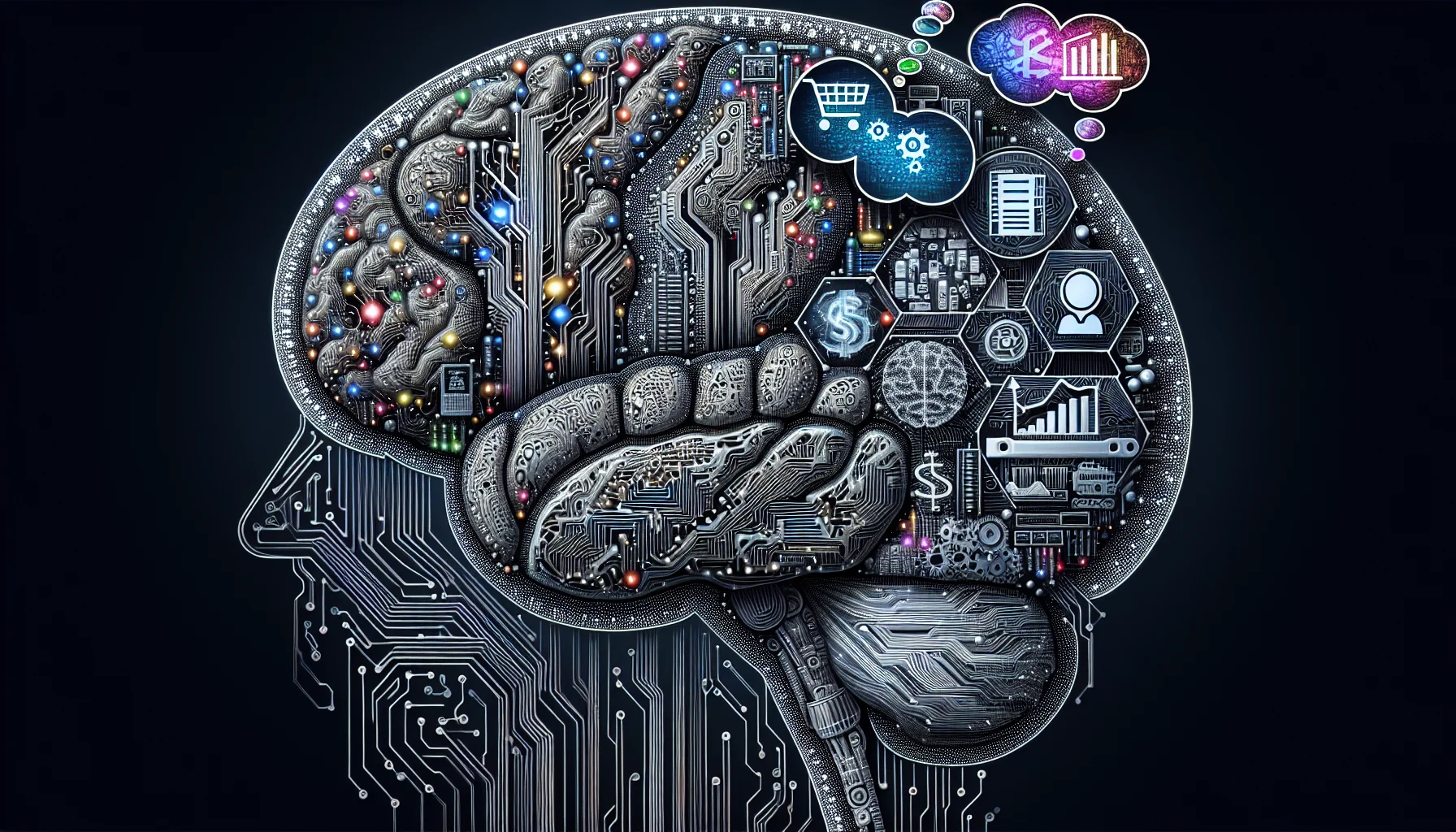Imagine a world where you can effortlessly engage with your customers, create captivating marketing campaigns, and unlock the full potential of your brand. With ChatGPT Prompts, this world becomes a reality. By harnessing the power of AI, you can now maximize your marketing opportunities like never before. Say goodbye to uninspiring content and hello to a personalized, interactive experience that will leave your audience wanting more. Let us show you how ChatGPT Prompts can revolutionize your marketing strategy and take your brand to new heights.

Understanding ChatGPT and Marketing
What is ChatGPT?
ChatGPT is an advanced language model developed by OpenAI that utilizes artificial intelligence to generate human-like text-based responses. It has been trained on large amounts of data from the internet, enabling it to understand and generate coherent and contextually relevant responses. ChatGPT has emerged as a powerful tool for businesses, including in the field of marketing.
How does ChatGPT work?
ChatGPT works by leveraging a technique known as deep learning, specifically a type of AI model called a transformer. It is trained on data from a wide range of sources, including websites, books, and online discussions. By using this data, ChatGPT develops a deep understanding of language patterns and semantics. When given a prompt or a message, it generates a response based on its training and the context provided.
Applying ChatGPT in Marketing
The use of ChatGPT in marketing opens up exciting opportunities for businesses to enhance customer engagement, provide personalized marketing experiences, automate sales funnels, and optimize lead generation. By leveraging the power of AI, marketers can create conversational experiences that are dynamic, interactive, and tailored to the needs and preferences of their target audience.
Benefits of Using ChatGPT in Marketing
Enhancing Customer Engagement
ChatGPT can significantly enhance customer engagement by providing interactive and personalized conversations. By simulating human-like responses, it creates a more interactive and conversational experience for customers. This helps businesses build stronger connections with their target audience and increase their brand loyalty. The ability of ChatGPT to understand and respond to customer queries in real-time also enables businesses to address customer concerns promptly, leading to improved customer satisfaction.
24/7 Customer Support
One of the key advantages of ChatGPT in marketing is its ability to provide round-the-clock customer support. Unlike human agents, ChatGPT-powered chatbots can operate 24/7 without fatigue or the need for breaks. This ensures that businesses can offer immediate assistance and resolve customer queries at any time, regardless of time zones or geographical boundaries. Having a reliable and always available customer support channel helps in building trust and convenience for customers.
Personalized Marketing Experiences
ChatGPT enables businesses to create personalized marketing experiences for their customers. By analyzing customer data and preferences, ChatGPT can generate tailored recommendations, promotions, and offers. This level of personalization helps businesses deliver targeted messages that resonate with their customers, leading to higher engagement and conversion rates. Personalized marketing experiences also contribute to a positive brand perception and customer satisfaction.
Optimizing ChatGPT for Marketing
Selecting the Right Use Cases
To optimize the use of ChatGPT in marketing, it is important to identify the right use cases that align with the business goals and customer needs. Common use cases include providing product recommendations, answering frequently asked questions, offering troubleshooting assistance, and guiding customers through the sales funnel. By selecting use cases that provide the most value to both the business and the customer, ChatGPT can be effectively utilized to achieve marketing objectives.
Creating Conversational Marketing Strategies
To maximize the effectiveness of ChatGPT in marketing, it is crucial to develop conversational marketing strategies. This involves defining the tone, style, and personality of the chatbot to align with the brand image and target audience. The chatbot’s responses should reflect the brand’s values and voice, ensuring consistency across all customer interactions. Additionally, marketers should focus on creating engaging and interactive chat prompts that lead to meaningful conversations with customers.
Maintaining Brand Consistency
While using ChatGPT in marketing, it is essential to maintain brand consistency throughout the customer journey. The chatbot’s responses should align with the brand’s messaging and reflect the same level of professionalism and accuracy. This consistency helps in reinforcing the brand identity and building trust with customers. Regular monitoring and training of ChatGPT can ensure that it maintains a consistent and coherent brand voice.
Building a ChatGPT-powered Marketing Campaign
Identifying Target Audience
In order to build an effective ChatGPT-powered marketing campaign, it is crucial to identify the target audience. Understanding the demographics, preferences, and needs of the target audience helps in tailoring the chat prompts and responses accordingly. By aligning the campaign with the target audience’s interests and pain points, businesses can drive higher engagement and conversion rates.
Creating Engaging ChatGPT Prompts
Creating engaging chat prompts is essential to captivate the attention of the target audience. The prompts should be designed to encourage users to interact with the chatbot and provide relevant information. Utilizing compelling language, asking open-ended questions, and incorporating interactive elements such as quizzes or polls can make the conversation more interesting and engaging. These prompts should also align with the overall brand messaging and objectives of the marketing campaign.
Integrating ChatGPT in Marketing Channels
To maximize the impact of ChatGPT in marketing, it is important to integrate it seamlessly across various marketing channels. ChatGPT-powered chatbots can be incorporated into websites, social media platforms, and messaging apps, allowing businesses to engage with customers wherever they are. By ensuring a consistent user experience across different channels, businesses can create a cohesive brand presence and facilitate smooth customer interactions.

Leveraging ChatGPT for Lead Generation
Developing Chatbots for Lead Qualification
ChatGPT can be leveraged for lead generation by developing chatbots that qualify leads. By conducting interactive conversations with potential customers, the chatbot can gather relevant information and assess their level of interest and intent to purchase. The chatbot can then qualify and categorize leads based on predetermined criteria, allowing sales teams to focus their efforts on high-potential leads and improve overall lead conversion rates.
Automating Sales Funnel
With ChatGPT, businesses can automate their sales funnel, streamlining the customer journey and improving efficiency. Chatbots powered by ChatGPT can guide customers through the different stages of the sales funnel, from initial awareness to purchase decision. By providing relevant information, addressing concerns, and making personalized recommendations, the chatbot can help customers move through the sales funnel seamlessly, ultimately increasing the likelihood of conversion.
Improving Conversion Rates
By leveraging the capabilities of ChatGPT in marketing, businesses can significantly improve their conversion rates. Chatbots powered by ChatGPT can assist customers in making informed purchase decisions, provide personalized recommendations, and address objections or concerns in real-time. This level of engagement and support can instill confidence in customers and increase their likelihood of making a purchase. The ability to offer personalized and timely assistance can also lead to higher customer satisfaction and loyalty.
Enhancing Customer Experience with ChatGPT
Understanding Customer Needs and Preferences
ChatGPT can greatly enhance the customer experience by understanding their needs and preferences. By utilizing natural language processing capabilities, ChatGPT can analyze customer queries and responses to gain insights into their preferences, pain points, and expectations. This valuable customer data can be used to improve products and services, tailor marketing messages, and deliver personalized assistance that meets individual customer needs.
Providing Real-Time Assistance
One of the key benefits of using ChatGPT in marketing is the ability to provide real-time assistance to customers. Chatbots powered by ChatGPT can offer immediate responses and solutions to customer queries, ensuring that they receive timely assistance. This real-time support helps in building customer trust and satisfaction, as well as reducing the need for customers to wait for a human agent to address their concerns. The availability of instant assistance enhances the overall customer experience and increases customer loyalty.
Offering Personalized Recommendations
ChatGPT can deliver personalized recommendations to customers based on their preferences and behaviors. By analyzing customer data and historical interactions, ChatGPT can generate tailored recommendations for products, services, or content that align with the customer’s interests. This level of personalization enhances the customer experience by providing relevant and valuable suggestions, ultimately leading to increased engagement, conversions, and customer satisfaction.

Overcoming Challenges and Risks
Avoiding Misinterpretation of Customer Requests
While ChatGPT is highly advanced, there is a risk of misinterpreting customer requests, leading to inaccurate or inappropriate responses. To overcome this challenge, businesses need to continually train and fine-tune ChatGPT to improve its language comprehension and context understanding. Regular monitoring and review of chat conversations can help identify and rectify any misinterpretations, ensuring that customer interactions are accurate and valuable.
Tackling Privacy and Security Concerns
The use of ChatGPT in marketing raises concerns regarding privacy and security. It is crucial for businesses to implement robust data protection measures to ensure that customer data is handled securely and in compliance with relevant regulations. Implementing encryption, access controls, and secure data storage practices can help mitigate potential risks. Transparency and clear communication about data usage and privacy policies are also important in building customer trust and confidence.
Monitoring and Moderating Conversations
While ChatGPT can automate many aspects of customer interactions, it is important to have proper monitoring and moderation mechanisms in place. Regularly reviewing chatbot conversations and implementing moderation tools or human oversight can help prevent any inappropriate or offensive content from being generated or shared. This ensures that customer interactions remain professional and respectful, safeguarding the brand reputation and maintaining positive customer experiences.
Measuring the Success of ChatGPT Marketing
Tracking Key Performance Indicators (KPIs)
To measure the success of ChatGPT-powered marketing efforts, businesses should track relevant key performance indicators (KPIs). KPIs such as customer engagement metrics, response time, conversion rates, and customer satisfaction scores can provide insights into the effectiveness of the chatbot in achieving marketing goals. By regularly analyzing and assessing these metrics, businesses can identify areas for improvement and optimize their ChatGPT marketing strategies.
Analyzing Customer Feedback
Customer feedback is a valuable source of information for measuring the success of ChatGPT marketing. Soliciting feedback from customers about their experience with the chatbot can provide insights into its performance and effectiveness. Businesses should encourage customers to provide feedback through surveys, ratings, or reviews, and use that feedback to identify strengths and areas for improvement in their ChatGPT-powered marketing campaigns.
Evaluating ROI of ChatGPT Efforts
Evaluating the return on investment (ROI) of ChatGPT marketing efforts is crucial to assess the overall impact on business outcomes. By analyzing the cost savings, lead generation, conversion rates, and customer retention rates associated with ChatGPT implementation, businesses can determine the financial benefits and effectiveness of their marketing campaigns. This evaluation helps in identifying the optimal allocation of resources and making data-driven decisions for future marketing strategies.

Future Trends and Developments
Integration of ChatGPT with Voice Assistants
One of the future trends in the field of ChatGPT and marketing is the integration of ChatGPT with voice assistants. This would enable businesses to provide a seamless and conversational experience across different platforms, including smart speakers and voice-enabled devices. By combining the power of ChatGPT with voice recognition technology, businesses can further enhance customer engagement and convenience, offering a more natural and intuitive user experience.
Advancements in Natural Language Processing
Advancements in natural language processing (NLP) are expected to improve the capabilities of ChatGPT in understanding and generating complex text-based responses. As NLP techniques continue to evolve, ChatGPT will become even more sophisticated in interpreting context, understanding nuances, and generating highly accurate and contextually relevant responses. These advancements will contribute to providing better customer experiences and expanding the use cases of ChatGPT in marketing.
Expansion of ChatGPT Use Cases
The use cases of ChatGPT in marketing are expected to expand in the future. As businesses and marketers explore the potential of ChatGPT, new and innovative applications will emerge. From virtual shopping assistants to personalized content creation, ChatGPT has the potential to revolutionize various aspects of marketing. Its ability to generate natural and human-like responses opens up endless possibilities for enhancing customer experiences, driving engagement, and achieving marketing objectives.
Conclusion
In conclusion, ChatGPT presents exciting opportunities for businesses to maximize their marketing efforts. By leveraging the power of AI, ChatGPT enhances customer engagement, provides personalized experiences, automates sales funnels, and optimizes lead generation. However, it is essential to carefully consider the right use cases, develop conversational marketing strategies, and maintain brand consistency when implementing ChatGPT in marketing campaigns. By overcoming challenges, measuring success, and staying abreast of future trends, businesses can unlock the full potential of ChatGPT and achieve remarkable marketing outcomes.
















